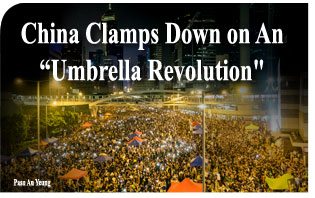 Hong Kong, one of the world’s major financial capitals, is the scene of violent clashes between the police on one hand, and students and young people on the other.
Hong Kong, one of the world’s major financial capitals, is the scene of violent clashes between the police on one hand, and students and young people on the other.
The issue has been festering for several years, but this time it has acquired unparalleled proportions. It is being called the “umbrella revolution” because demonstrators rely on umbrellas to defend themselves from water canons and tear gas released by the Chinese police.
Occupied by the demonstrators, the Central District, heart of the city’s financial institutions, resembles a fortified camp, the Paris daily Libération reported.
Hundreds of police in riot gear tried to dislodge them using shields, batons and tear gas. The youth fought back “armed” with umbrellas, homemade masks, goggles and makeshift barricades.
The dispute is over a vital issue: the Beijing government has drastically emptied the meaning of the elections to be held in the city.
While the suffrage will be universal, the candidates have been picked through a convoluted and obscure process. The end result is that all candidates will represent roughly the same thing: the will of Beijing’s socialist government.
Protesters feel cheated: What kind of democracy is this, in which all candidates say more or less the same things and basically obey the same ideology?
The number of candidates for every office or position cannot exceed “two or three” and all must be approved by the Communist Party.
“Umbrella revolutionaries” fear that Beijing will send in tanks as it did to crush the freedom movement on Tiananmen Square in 1989.
Still, the young people have decided to launch a “civil disobedience campaign” ahead of schedule. The stakes are all or nothing. It is harder to send in tanks now, when there is still a remnant of freedom, than tomorrow, when the Communists will have consolidated their position in the territory.
As is usual in Communist dictatorships, the regime has blamed its citizens’ rebellion on “foreign interference” (read: the United States and Britain).
“Hong Kong is China” and the territory’s affairs “belong to Chinese sovereignty,” said Hua Chunying, a spokesman for the Ministry of Foreign Affairs, during a press conference.
Hua was referring to the reactions of many free nations in the face of violent repression of democratic demonstrations. The territory has been in the process of reintegration into China since 1997, with explicit safeguards for its acquired freedoms.
According to the Spanish daily El Mundo, the spokesman insisted that the Chinese government refuses to support any initiative of the democratic movement, which it arbitrarily calls “illegal.”
Hua has described the ongoing protests in Hong Kong as “illegal assemblies” which, according to China’s dictatorial system, “undermine the social order and the rule of law,” both of which Chinese socialists have never taken seriously.
To date, the police have employed massive violence and tear gas against the population of Hong Kong. One would have to go back to the times of Maoist repression in the 1960s to find anything like it, wrote the Paris daily Le Figaro.
The demonstrations are spreading across poor neighborhoods and a giant rally has been held on the 1st of October, anniversary of the Communist takeover in China.
“The population is angry,” said Jean-Pierre Cabestan, professor at Hong Kong Baptist University. “They feel cheated. We will fight to the end to prevent [Hong Kong] from becoming a Chinese city like the others” (where there is no freedom), he added.
In June, the movement had collected 700,000 votes supporting a referendum (not recognized by the government) against Beijing’s attempts at stifling Hong Kong’s freedom.
Taken by surprise by the extent of the protests, Beijing withdrew their riot police, but the crowd remains on the warpath.
For the French newspaper Le Monde, the memory of Tiananmen (April-June 1989) is alive in many people’s minds, including Communist Party leaders. In Tiananmen Square, the largest public square in Beijing, demonstrations were crushed and hundreds of young people massacred.
It is unlikely that tanks will run over Hong Kong demonstrators, Le Monde reckons, but many in the government are asking for that “solution.”
Since the Communist Party enjoys no great sympathy in Hong Kong, it relies on camouflaged parties with misleading names such as DAB (Democratic Alliance for the Betterment and Progress of Hong Kong).
After clashes that sent 26 youths to the hospital, Tsang Wai Hung, head of the local police, promised that he will only make a “minimum use” of force.
For its part, the Occupy Central Democratic Movement condemned the authorities’ “unilateral” conduct and demanded that the police apologize. The violent repression is drawing much sympathy from Chinese and international public opinion.

